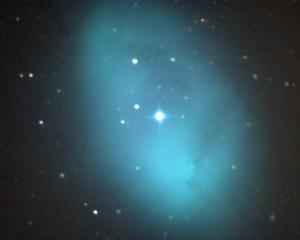These days, Easter is a welcome long weekend associated with chocolate Easter eggs and Easter bunnies, when we hope to make the most of the dry autumn weather. It's also a movable feast and may fall any weekend between March 22 and April 25. Charmian Smith talks to Dr Tim Cooper about why the date changes from year to year.

• The unconditional gift
The death and resurrection happened about the year AD33 at the time of the Jewish Passover or Pesach, a spring festival celebrating the night about 1500 years earlier when, according to the Old Testament, the angel of death slew the eldest child in Egyptian households, but passed over Jewish houses which had been marked with the blood of the sacrificial, or paschal lamb.
The Jews had been enslaved in Egypt for generations, and this event finally persuaded Pharaoh to allow them to leave.
Jesus, who was a Jew, was crucified on the day of preparation for the Passover, Nisan 14, the full moon of the first month in the Jewish lunisolar calendar, which happened to be a Friday that year.
Because the Sabbath, the Jewish holy day on which no work could be done, began at sundown on Friday evening, his body had to be hurriedly taken down from the cross and laid in the tomb.
Early on the third day, Sunday, so the Gospels say, two women who were followers of Jesus went to the tomb to anoint the body, but found it empty, but an angel told them Jesus had risen from the dead.
Jesus also appeared to his disciples and other followers.
Although there are varying opinions about the resurrection, there is a respectable body of scholarship that says it was a belief in it that gave the earliest Christians such force and impact, according to Dr Tim Cooper, lecturer in the department of theology and religion at the University of Otago.
The belief that Jesus rose from the dead is central to Christianity and the earliest celebrations of the resurrection, known as Pasch, took the form of an all-night vigil on Nisan 14, whichever day of the week it fell on, he said.
However, in the second and third centuries there was a drift away from celebrating the resurrection on Nisan 14 to celebrating on a Friday (now known as Good Friday) and Easter Sunday.
Sunday became increasingly important in Christianity, especially in the 4th century when the Emperor Constantine (288-337) privileged the religion, he said.
It was the day on which Christians celebrated the resurrection each week, and it also differentiated the Christian "Lord's day" from the Jewish Sabbath (Saturday).
Christians also wanted to separate their festival of Pasch or Pascha from the Jewish Passover, Pesach, he said.
However, groups of Christians continued to celebrate Easter on different days, which put out much of the ecclesiastical calendar including Lent (the 40-day fast before Easter) and Pentecost (50 days after Easter).
To try to achieve some coherence, the Council of Nicaea in AD325 decided that if Nisan 14 fell on a Sunday, Easter would be celebrated the following weekend, but not everyone agreed. To this day, the Orthodox or eastern churches, who use a Julian rather than Gregorian calendar to calculate Easter, may celebrate it from one to four or five weeks later than Catholics and Protestants.
In early Britain, the date of Easter varied between the Celtic Christians who influenced the northwest, and the Roman Christians of the southeast, but this was resolved at the synod of Whitby in 664, when they agreed to adopt the Roman system.
Dr Cooper says there were efforts in the 1970s to set the date for Easter on the second Sunday in April, but the Orthodox churches would not countenance it.
"It's regrettable that in the history of Christianity there's been a fair bit of dissension about the dating of Easter," he said.
It is generally thought the Western Easter now is on the Sunday following the first full moon after the northern hemisphere vernal equinox, but it is actually a little more complicated, in that the equinox is taken as March 21 which it was in 325, rather than the actual astronomical equinox.
Also the paschal full moon is used which is calculated on a 19-year cycle, and may differ from the actual, astronomical full moon.
Easter in the northern hemisphere is a spring festival, heralding new life after winter.
In fact, the English word "Easter" is said to come from Eostre, the Teutonic goddess of dawn and spring.
In 595, Pope Gregory sent Augustine of Canterbury to England to convert the pagan King Ethelbert.

Augustine was to work within the culture, according to Dr Cooper.
"If there's a sacred site, let it remain sacred, but make it sacred in a Christian sense. If there's a local festival at the same time, don't stop it; Christianise it.
"So those who say Christmas and Easter were pagan festivals in the beginning are mostly right in a sense."
That is where Easter bunnies and Easter eggs, a sign of new life which give extra meaning to Easter, come in, he said.
However, here in the southern hemisphere, Easter falls in autumn.
"It's bizarre that in the southern hemisphere we celebrate Easter at the time we do, because it makes so much sense to celebrate it when everything is coming to life, but we celebrate it at a time when everything's closing down and dying, and with that we miss out on an important dimension," he said.
"In New Zealand society now, it's just a long weekend.
How do you attach significance to it when everything's dying and the leaves are falling and it's heading into winter?"
However, he says he's relaxed about it becoming a general holiday and a time to sell chocolate.
"This is a personal opinion, but I don't expect New Zealand society to observe the Christian story at Easter.
"I don't have religious objections at all if shops are allowed to open any time they like over Easter. I don't think the churches can expect New Zealand society to observe Easter in the way the Christian churches do.
"It's something that is special and precious to Christians that should be respected, but the churches shouldn't seek to impose that on society.
"People can have their days off and enjoy them in ignorance of what Easter is about for Christians, and that's fine."












